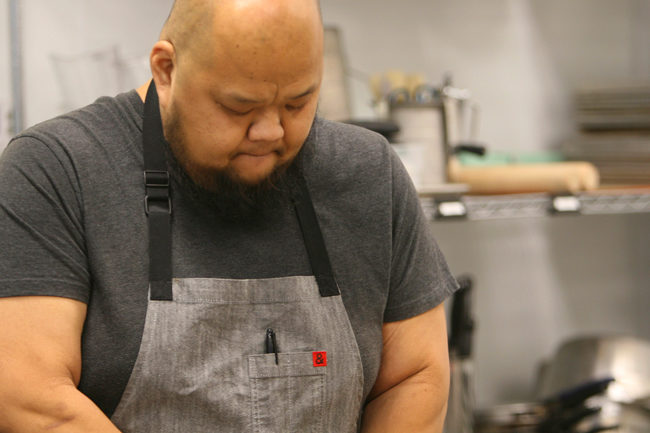
Yia Vang is the 32-year-old owner of Union Kitchen, a pop-up that holds dinners all over the Minneapolis-St. Paul metro — in the middle of a farm field, in partnership with a restaurant or cooking school. He’s tying on his apron, rolling up his sleeves, and bringing his idea of kitchen to wherever you are. And he does it through storytelling. He’s energized by drawing connections between crafts, cuisines, and cultures in pursuit of ethnic harmony. Food just happens to be his medium for exploring this narrative.
The metro area is home to the largest urban Hmong population in the world, and yet, how many residents really know what Hmong food is? In this urban center of Hmong culture and cuisine, Yia Vang’s voice rises to explain it.
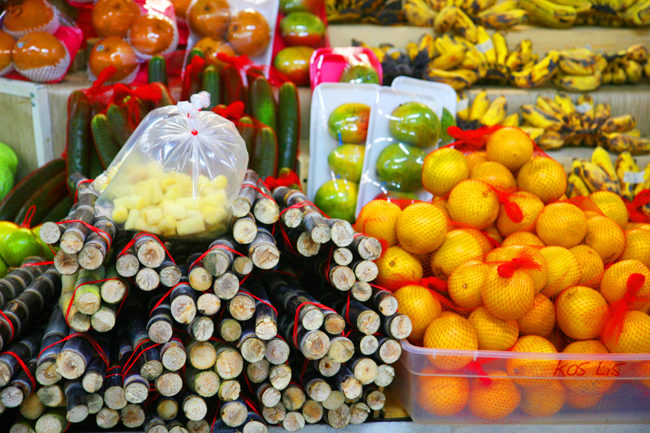
In a recent meeting, Vang guided me around Hmong Village, an indoor marketplace in St. Paul filled with Hmong vendors, restaurants, and a farmers market. He knew the best places to build our lunch sampling: purple fermented rice from one vendor, braised mustard greens from another, crisp pork belly from yet another. He stood with me as I gazed in awe at the papaya salad being made for us in a giant mortar and pestle: A tiny woman with ridiculous strength ground hot Thai chili pepper with sugar and salt and then cut a lime on the edge of the mortar, adding its tart juice and pulp.
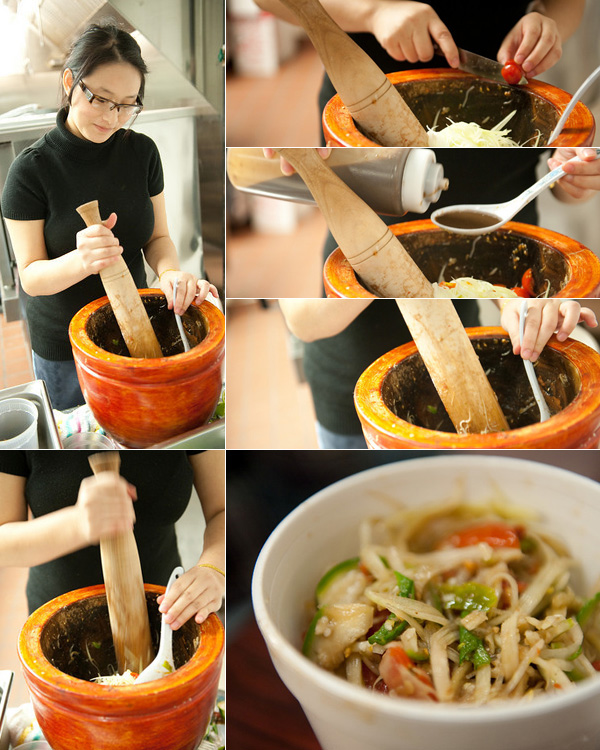
She mixed in thin shreds of green (unripe) papaya that she made by hacking fine lengthwise lines into the fruit and slicing off the shreds. Tomato, Thai eggplant, and Chinese long beans were next. Last she added a house fish sauce and paste to toss the salad together. Each vendor has its own family recipe for the sauce. We claimed a table, and Vang rolled out our feast. He explained the importance of all the tastes in Hmong cooking: sweet, sour, salty, bitter, umami. When I looked up and saw two young girls sprinkling slices of unripe green mango with chili pepper and fish sauce for a treat, I understood.

UPBRINGING
YIA VANG: I grew up in a Hmong immigrant family. I was born in Thailand, and my family moved here in 1989, when I was five. Hmong culture is filled with festivals for every occasion: birthdays, new babies, weddings, funerals, and Hmong New Year. Food is a part of all of them. There’s a sense of building the barn together. We have no such thing as invitations. That’s a Western thing. I grew up saying, “Hey, isn’t this person’s cousin getting married? Let’s go there. I’m hungry.”
For our festivals, women handle the vegetables, and the men gather outside to cook the meat, just like back in the hills of Thailand. My dad and uncles would be out back, cooking meat over an open flame, and my mom and aunts would be in the kitchen. Once, when I was 10, my dad handed me the tongs out on our makeshift grill. Being in charge of the meat for the family was a passage of manhood, like shooting your first buck. Growing up, dad didn’t believe in tee ball, he taught practical things like whole-animal butchery. I grew up in central Wisconsin, so we bought animals from Amish farmers. I was a kid comfortable around knives and breaking down whole animals. For me, that was childhood.
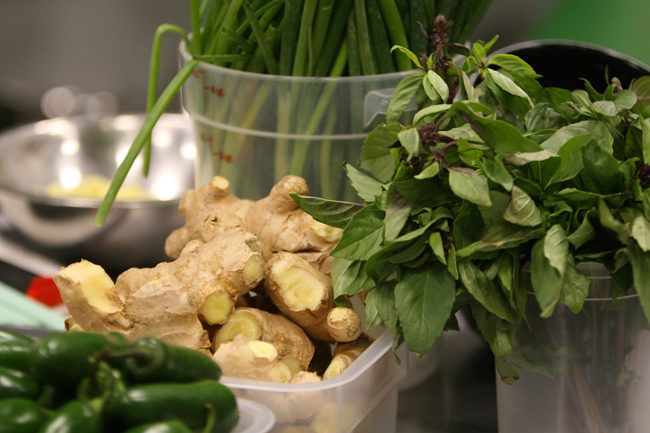
HEAVY TABLE: Did you grow up eating traditional foods?
VANG: Back in the homeland, to eat a lot of meat meant prosperity. As the first Hmong people coming to the U.S., this was a way to show we’d come far. We ate a lot of whole grilled meats and larb. Larb is minced chicken, pork, or beef with mint, cilantro, culantro, and Vietnamese mint. If we were eating beef, sometimes it’d be raw, like tartare. You throw all the herbs in, and add coriander, cumin, other spices, sometimes offal pieces and tripe. What binds it together is the toasted rice flour. It gives a nuttiness. You serve it with lettuce leaves and sticky rice. It’s super herbaceous.
In Hmong families, you grind meat with a meat cleaver, another test of your manhood. You double up with cleavers in both hands. Hmong people aren’t great at embracing technology. I remember the first time I showed my mom she could use a Vitamix for making her rice flour instead of using a mortar and pestle. And she was like, “this changes everything.”
We really didn’t have desserts. My parents would be like: “Here’s an orange or a banana.” The whole high-fructose corn syrup type of desserts are an American thing.
I remember desperately wanting things like Gushers, Capri Sun, and Lunchables just to be normal, like the other kids. I got made fun of for having grilled chicken, pepper sauce, and fermented mustard greens. I’d get questions like “what’s that weird ketchup?” when I had Sriracha, or “did you have Chinese food last night?” because I’d have rice at school. Now all the kids who made fun of me are jealous.
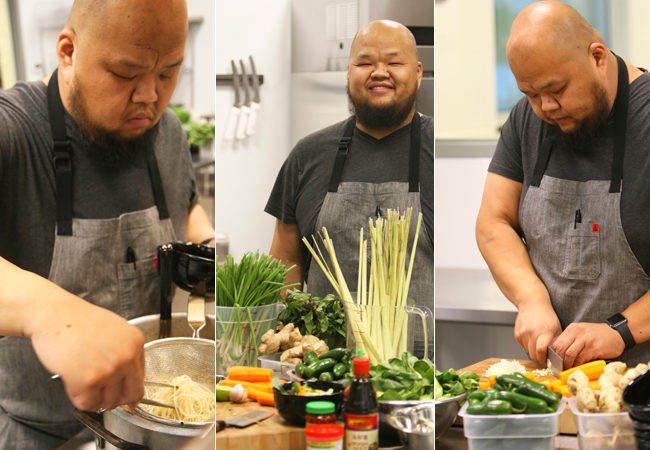
HEAVY TABLE: Any especially vivid food memories of your childhood?
VANG: When I think back, I hear the giggles and gossip of my aunts in the kitchen talking about someone who is getting married or someone getting divorced. I hear the clinking of dishes. I hear the water running, washing all the vegetables. I see kids running around. I hear the sounds of chopping and slicing. I can smell steamed rice. I can see my aunts washing dishes outside with a big bucket of water, even with a full kitchen inside. They have such nostalgia for the homeland. I laugh about it all the time, like “Why aren’t they caught up?” They have iPhones, but they love doing things old school. I hear the voices of my uncles outside, talking about the way things were. I can hear sizzling, and then I smell the pork fat melting into hot coals. My dad believed in building stuff, so I see this rink-a-dink, jimmy-rigged tent, wired to a tree, where we used to cook outside. I loved it.
FORGING A PATH
HEAVY TABLE: How did you make your own creative path?
VANG: After high school, I went to college and needed a part-time job. I started working at this Italian fine-dining restaurant called Ciatti’s in La Crosse, Wis. They threw me onto the grill. I guess it’s something about being a bigger guy. I learned really fast. It was a steakhouse, the kind of place you’d go to impress your girl and have steak and shrimp. I learned how to cook by touch and feel. Then I started to hate restaurant cooking. You have to work while other people play. In our culture, being a cook is what everyone does. It’s not a place you build a career. I vowed to never have a job where I had to be in the kitchen. I vowed to get a real job.
I graduated from U.W.-La Crosse with an interpersonal communications degree. I stayed in La Crosse right after graduation and worked for a nonprofit called Crossfire with inner city kids, kind of like Teen Challenge. There was a kitchen in the back for different events, and I kept an eye on it. The kids helped me. They weren’t classically trained, but they worked hard. My heart changed then about the kitchen and planted a seed.
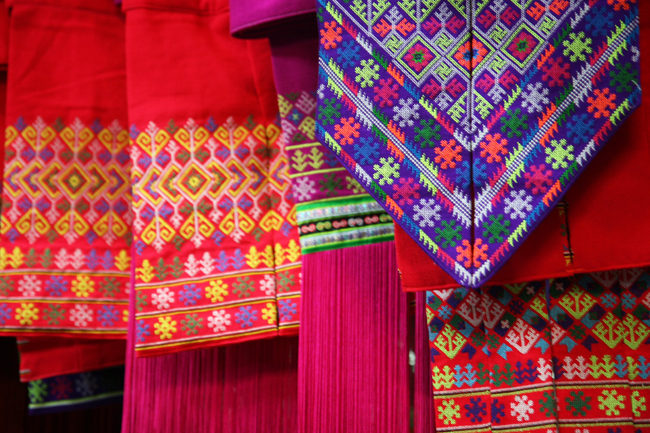
I ended up moving to Minneapolis and taking a job at my church, Bethlehem Baptist, managing their kitchen. I was feeling lost and didn’t know what was next for me. My pastor showed me food is more than what we eat, food is what helps tell the story. I began thinking: Why does church food have to be bad food? It became fun, and people gathered. I did pop-ups in members’ backyards for events.
After working for the church, I worked at Nighthawks, Borough, and Spoon and Stable. I learned a lot, and all are great places. Working at each of them helped me find my voice.
The kitchen unifies us. But it doesn’t need to be confined to a room or a building. A kitchen is where food is made and served, and that could be on the corner of a street. What if a kitchen could come to you, and you could come to us? Union Kitchen isn’t a brick-and-mortar space, but a mobile kitchen that sends a beacon of where we’re from. We have three convictions: We cook, we teach, and we host. We believe that food has a narrative.
HEAVY TABLE: Was your decision supported by those closest to you?
VANG: My parents had reservations about the challenges of starting a business. At first I thought they weren’t supportive, but then I saw their heart more. It’s kind of like being a toddler again; they had to let me fall a bit. My parents come to my pop-ups now and think they’re going to be put to work. But I’m like “No, just eat!” My cousins get involved and help. It’s become a family thing.
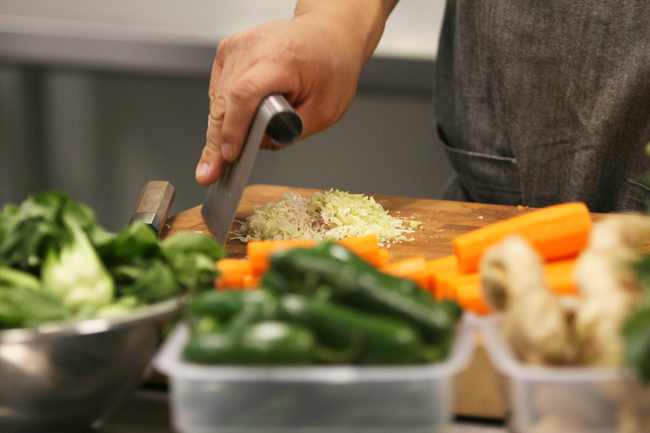
HEAVY TABLE: Did you have any early mentors?
VANG: I went to a predominantly white school and was [part of] one of only four Hmong families who went there. The industry of our town in Port Edwards, Wis. was the paper mill. My J.V. football coach once said to me, “When you graduate, leave this town and never look back. Your aspirations are farther than this place.” Until then, I was used to the mindset of “do what you do, and keep to yourself.”
In college, it was my friends. We were all poor, and I was the cook. We’d go to Cub Foods and get 15 pounds of chicken legs for 28 cents a pound. We’d get a bag of potatoes, and I’d make mashed potatoes. Friends would invite friends. There’d be some guys we knew, and some we didn’t know. We didn’t charge them anything. We said, “Just come and eat.” This is critical in my philosophy. One night, we were all sitting around the table. There was a ton of food. There were all different dudes. A tiny hipster nerd, a superstar all-American athlete, the guy who couldn’t catch a ball if his life depended on it, the inner city dude. They were all telling jokes, they all came from different backgrounds, and they all became buddies around that table. The reason I love to cook is that I first cooked for them. A bunch of dudes who didn’t have money, but made it work. There are seven guys from those dinners that are the heart and soul of what drives Union Kitchen.
There was also my buddy Mike, who was the pastor at my church. We’d spend a lot of nights at Nighthawks. We would talk, and he would let me dream. When we were forming the website for Union Kitchen, he wrote it all down for me. While we were doing that, Union Kitchen was born.
And now, it’s the community. It’s Eddie Wu at Cook St. Paul, the guys at LolaRosa, the guys at Dumpling. This is why you do it. Humans aren’t motivated by themselves. We’re lazy, and we have our failures. But then I think of my father and mother, who moved us here. I think of the friends and strangers who sat out in the cold for two hours for my first pop-up. I email and send notes to personally thank everyone for coming. I want them to know they’re a part of it. They’re not just a customer to me, they’re family.
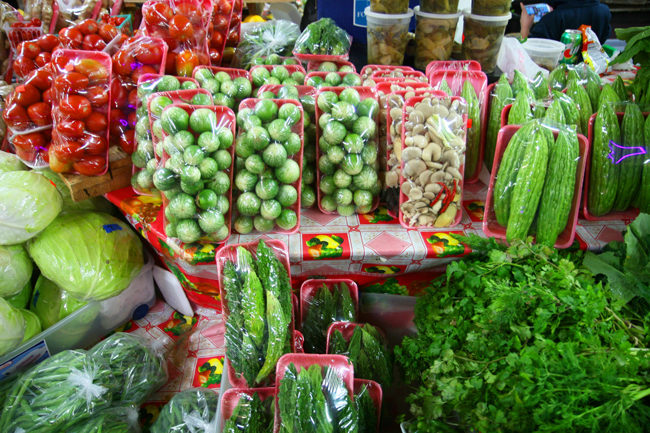
FINDING A VOICE
HEAVY TABLE: What has molded your sensibilities on food?
VANG: I try to be true to the way I’ve grown up. I came to a point in life where the food I wanted to eat was the food of my people. I was a communications major in college, and I remember being asked the question, “What’s more important, interpretation or intention?” Interpretation is more important to me. I do no justice for my people or culture if I’m not interpreting our food with them in mind. I want someone to boldly ask me what Hmong food is, and I want to explain. Hmong people gather from all the different areas they’ve come from, there’s a cultural DNA interlink. We have no type of food. We have a philosophy of food. Thailand, Vietnam, Cambodia, China — Hmong people have lived in all of those areas. This idea became my platform.
I like to play with the idea of something familiar, pay homage, and put a Hmong twist on it. You first have to understand how a dish came to be. I’ll research the heart and the history of a dish and why a grandma would’ve made it for her church gathering. I discovered that with most of the hot dishes in the Midwest, they developed out of not having much, but wanting to serve the community. And a light went off. That’s the core of what being a Hmong immigrant family is. This connection became easy once I spent a week in research. I came up with a Hmong tater tot hot dish for the State Fair with Marshall Paulsen from Birchwood. You have to find a way to work together and share ideas, and I think one of the most non-offensive ways is through food.
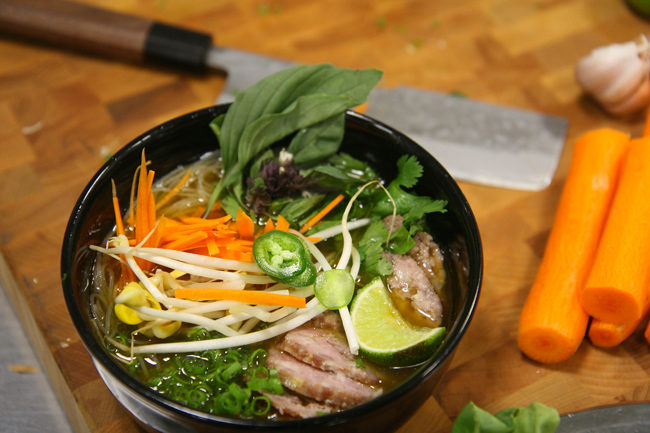
HEAVY TABLE: What does it mean to you to be authentic?
VANG: Authenticity is a closed and open fist. It’s not being absolute. It’s not saying, “This is the only way this thing can be made.” Authenticity depends on where your heart is, your intention. Are you tightly holding onto something, preserving it out of fear? Authenticity is unspoken, transparent. I pay respect to what I’m cooking, but I look at the culture we live in now. The way I do braised mustard greens is different than the way I grew up eating it. My family put the bones in water and threw in the vegetables. I like to roast my bones and caramelize them. This is a French technique. Then I put the bones in water and let them steep overnight and reduce down. I take riblets and sear them until they’re crispy and smoky, and only then do I add my greens. The reason I make that dish isn’t to show my family up, but because I want to honor them. This dish was a critical part of my childhood. There was never a time for me when this wasn’t on the table. My parents brought me here to learn and elevate what they knew. To honor my parents with cooking is a gift.
INSPIRATION + BALANCE
HEAVY TABLE: In the midst of chaos, what do you crave to find balance?
VANG: Mise en place. Washing dishes. On a philosophical level, I’m trying to make a difference and change how people think about food. There’s no finish date to that. You don’t necessarily see the fruits of your labor. But when I wash dishes, there’s a beginning and an end. When I’m scrubbing pots, my mind goes blank; all I’m thinking about is how to get a stupid burnt piece off a pan. I’m centered when I’m prep cooking. One of my OCD things is prepping and putting things in deli cups. To de-stress, I organize the kitchen. The most beautiful thing I’ve ever seen is a shelf of deli cups, all with blue tape, labeled and dated. I want to be like, “Nobody touch this!” but the truth is that you get two seconds to enjoy it before it’s a hot mess.
HEAVY TABLE: Is there a plate or style that you’re particularly proud of?
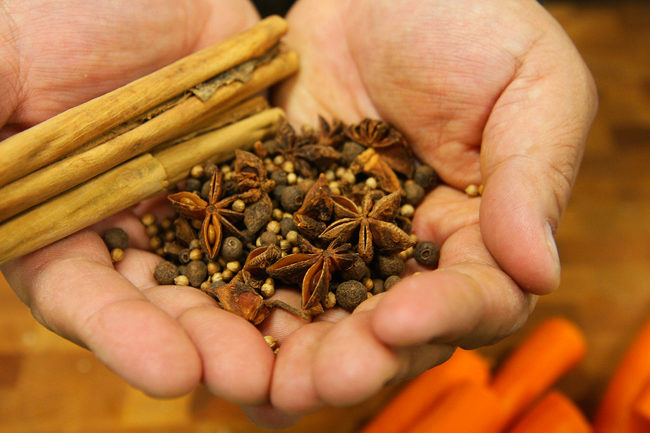
VANG: It’s simple cooking. It’s not foams, it’s not sous vide. I think of my father, and I go back to the first time he handed me the tongs. It was so simple. The fat did most of the work. At the core of it all, my people had huts and lived in the hills of Laos and Thailand. They had a fire and a pot or vessel to steam rice. If they were lucky, they had a misshapen wok. Fire wasn’t just heat, it was life. It was the center of their life. When I cook over fire now, that’s the simplicity I think of. The Midwestern idea of a bonfire reminds me how blessed I am. I still always want to throw a grate on it. I never want to be so far from the other end.
CREATING IN TODAY’S WORLD
HEAVY TABLE: What does it mean to you to be a contemporary creative person?
VANG: It means you’re open to change without losing a piece of yourself. Lord willing, twenty or thirty years from now, I’ve kept integrity. Do you know where the word integrity came from? It comes from metal-working. You heat up the piece of metal, pound it down, hammer it. If it doesn’t break, that’s integrity. That’s being a creative person today.
HEAVY TABLE: Any recent partnerships you can share that have brought forth a product or idea?
VANG: Cook St. Paul has become a huge platform. Eddie Wu took me in when no one knew what pop-ups were. He took a chance, and said, “Here’s a spot, anytime you need.” Not a lot of restaurant people do that. We’ll do a Korean pop-up night, and it’ll be overrun by people. Eddie is the kind of guy who’s tatted up with sleeves and long hair, who’s into literature. He’s a restaurant guru. I go to him and trust him. It’s become an awesome friendship. We are both dreamers.
I’m also teaching a series of classes at The Good Acre on making pho, dumplings, spring rolls, and banh mi. I’m really excited to work with them.
HEAVY TABLE: What is the relationship of social media to what you do?
VANG: It’s everything. As a young startup, it’s free marketing. It’s a visual storefront. We live in a visually driven world now, and I have a love-hate relationship to it. People are always looking for the next big thing. They’re curious about what they don’t know. The great side to it is that it gathers people easily and gets the message out fast.
HEAVY TABLE: With our world more “connected” than ever before, how do you think both locally and globally in what you make?
I’ve learned how connected everything is. There’s a bigger world watching. You need a bigger world view, and I love that. I love the ripple effect. I might be making a dish in Minnesota, and a guy in Sri Lanka is making the same thing, calling it something different. I had a lady in France send a message saying, “Keep up the good work!” She found us through a hashtag. If I look at changing the whole world, it’s too big and I get overwhelmed. But if I look at a group of twelve friends, I can work to change them and how they think about food. If the world somehow wants to listen in on it, that’s awesome.
SOCIAL JUSTICE
HEAVY TABLE: How do you work toward social and food justice in our community?
VANG: The pendulum swings on what people care about, and you can’t scare them into making choices. I’ve been asked why my family eats the way we do, and why we don’t eat less meat. I tell them my family came from a refugee camp where they had to feed a family of nine off of nothing. You have to hear the stories and get an understanding. You need to know the context and learn the narrative to work toward justice.
HEAVY TABLE: Are there any particular causes or organizations that are dear to you?
VANG: I work with HAFA, the Hmong American Farmers Association. HAFA started because Hmong farmers didn’t have opportunities to get stalls in the farmers market. They weren’t grandfathered in. They were working so hard and not getting paid what other farmers were. They were stepped on and had to sell to anyone because they were so poor. HAFA came together to help our people.
On Friday nights during market season, farmers are getting everything ready to go to the market stand. They’re at the farm harvesting, washing, prepping, and loading up trucks. They don’t get done until 9 or 10 at night, and that means skipping dinner. HAFA had the idea to bring people together for a meal. I cook. The farmers come in from the fields. CSA members are invited. Everyone sits at the same table and eats together. I look at the farmers’ faces and see their tired eyes, their hands filled with dirt, and I think, this is who I want to cook for. These are my people.
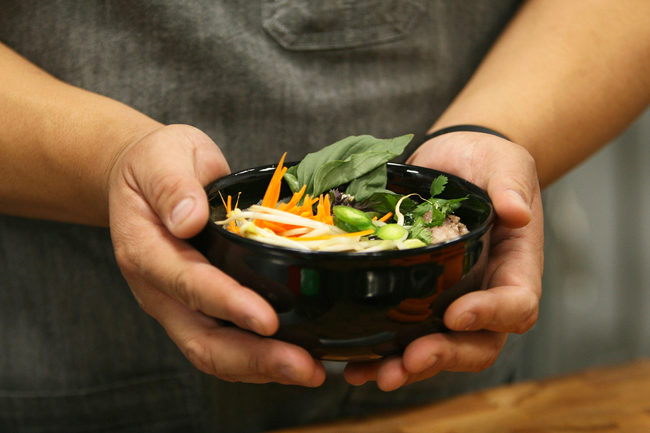
NOW
HEAVY TABLE: Can you share some insight into your process?
VANG: When you eat food, it evokes memory. I want to either jog a memory in you, or share one of my memories with you. If I’m making pho for you, I’ll be brought back to my mom’s kitchen. Everything in her kitchen would be lined with tinfoil because she wouldn’t want it to be messy. She’d have a pork dish broiling, and the smell of its fat would linger in the house. The fan was always on to get the smell out. It’d be winter, and all the windows would be steamed up. I can smell the star anise, the cumin, cinnamon, cilantro, and basil. The hint of fragrance with something just fried. Like soup kitchen meets KFC. I felt safe, and time was simple.
HEAVY TABLE: What have you learned from cooking that has added to your understanding of yourself?
VANG: Learning how to communicate and walk in other people’s shoes. If I am teaching someone knife skills who has never held a knife before, then I have to get in their mind. In doing that, I’m engaging people with different beliefs, sexual orientations, and cultures. It makes me a better cook and a better man.
To try Vang’s interpretation of Hmong food for yourself, sign up for one of his cooking classes at The Good Acre or join Union Kitchen’s One Year Celebration at Cook St. Paul.
Union Kitchen Pop-Up One Year Celebration, Cook St. Paul, 1124 Payne Ave, St. Paul, MN 55130; Sat, Feb. 4, 5-9 p.m.

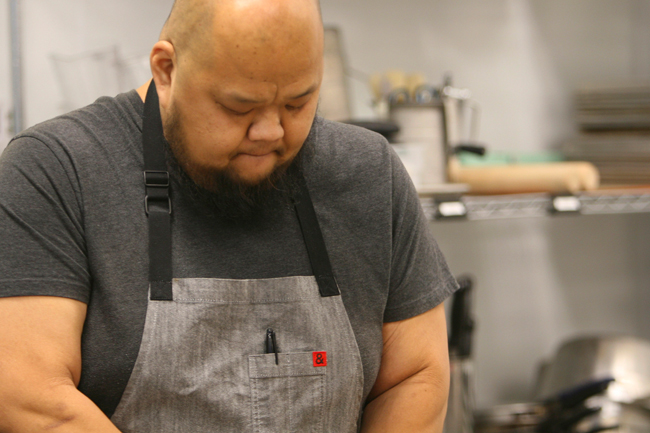
Yia vang you always made us smile. A very talented young man that no matter what you decided to do you would do it well. port edwards is abvery little town but it was and is a good place to grow up. I see my kids accomplish so much. Chefs, doctors, soldiers, sailors, teachers, pharmacists, salesmen, working in industry or behind a counter or being a loving parent. Each and everyone has dreamed a dream and work at making it come true. Keep it up and dream on. God bless. Mrs. Dykstra